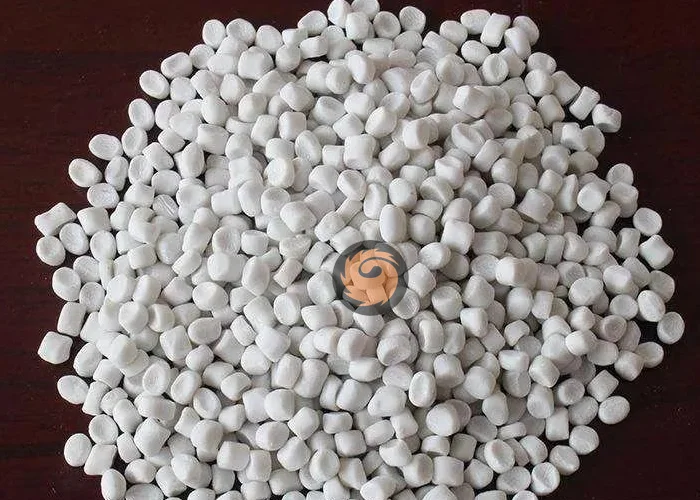In today’s competitive plastics industry, manufacturers constantly seek ways to reduce production costs, improve product performance, and enhance processing efficiency. One of the most effective solutions is the use of filler masterbatch. Widely adopted across industries such as packaging, injection molding, blow molding, film extrusion, and sheet production, filler masterbatch helps balance cost-effectiveness with high-quality performance.
This article provides a comprehensive guide on filler masterbatch, including its composition, advantages, applications, types, selection tips, and market trends. Whether you are a plastics manufacturer, product designer, or procurement manager, this resource will help you make informed decisions when choosing the right masterbatch for your production line.

2. What is Plastic Filler Masterbatch?
Filler masterbatch is a concentrated mixture of inorganic fillers, additives, and a polymer carrier resin. It is designed to be blended with raw polymers during processing to reduce material costs, enhance mechanical properties, and improve processing performance.
2.1 Typical Components
- Base Resin (Carrier): Commonly PE, PP, PS, or EVA, ensuring perfect compatibility with the final product.
- Fillers: Primarily calcium carbonate (CaCO₃), talc, barium sulfate, or kaolin.
- Additives: May include dispersants, processing aids, and stabilizers for better uniformity and performance.
2.2 How It Works
Filler masterbatch is mixed into the base polymer during extrusion, injection, or blow molding. The fillers integrate with the polymer matrix, enhancing dimensional stability, surface finish, and cost-efficiency—without compromising essential properties.
3. Key Advantages of Filler Masterbatch
3.1 Cost Reduction
Using filler masterbatch allows manufacturers to reduce the overall polymer consumption by replacing a portion of expensive virgin resin with cost-effective fillers.
3.2 Improved Mechanical Properties
High-quality filler masterbatch can enhance stiffness, toughness, and heat resistance of plastic products, especially when formulated with micron-sized fillers.
3.3 Better Processability
- Improves melt flow index (MFI) for easier processing
- Reduces cycle time in injection molding
- Enhances film thickness uniformity during extrusion
3.4 Surface Finish & Aesthetic Quality
Filler masterbatch helps achieve smooth surfaces, matte finishes, and high whiteness levels, making it suitable for packaging films, injection-molded parts, and household goods.
3.5 Sustainability & Recycling Benefits
Some filler masterbatches are specifically designed to work with recycled polymers, helping reduce environmental impact while maintaining product quality.
4. Types of Filler Masterbatch
Filler masterbatches are categorized based on filler type, carrier resin, and end-use applications.
4.1 Calcium Carbonate (CaCO₃) Filler Masterbatch
- Most widely used type
- Ideal for blow films, injection molding, and extrusion
- Benefits: Cost reduction, improved rigidity, better printability
4.2 Talc-Based Filler Masterbatch
- Excellent heat resistance and dimensional stability
- Common in automotive parts, electronics, and appliances
4.3 Transparent Filler Masterbatch
- Uses ultra-fine fillers to maintain high transparency
- Suitable for food packaging films, cosmetic bottles, and PET containers
4.4 Biodegradable Filler Masterbatch
- Designed for compostable and eco-friendly plastics
- Popular in single-use packaging and agricultural films
5. Applications of Filler Masterbatch
| Application | Polymer Base | Benefits | Industries |
|---|---|---|---|
| Blow Film | PE, PP | Cost reduction, better printability | Packaging, food wraps |
| Injection Molding | PP, PS, ABS | Improved rigidity & impact strength | Household goods, electronics |
| Blow Molding | HDPE, PP | Lightweighting & enhanced gloss | Bottles, containers |
| Extrusion Sheets | PET, PP, PVC | Smooth surface & dimensional stability | Automotive, appliances |
| Non-Woven Fabrics | PP | Enhanced softness & uniformity | Medical, hygiene, textiles |
6. How to Choose the Right Filler Masterbatch
Selecting the right filler masterbatch depends on several factors:
6.1 Polymer Compatibility
Ensure the carrier resin matches the base polymer (e.g., PE-based masterbatch for PE products).
6.2 End-Use Performance
- For packaging films → Focus on printability & smoothness
- For automotive parts → Prioritize heat resistance & stiffness
- For transparent applications → Use nano-sized fillers
6.3 Filler Loading Level
Higher filler content reduces cost but may affect mechanical strength. Balance performance vs. savings based on your application.
6.4 Regulatory Compliance
For food packaging, ensure the filler masterbatch complies with FDA, EU, or RoHS standards.
7. Filler Masterbatch Market
The filler masterbatch market has witnessed significant growth due to increasing demand for cost-efficient, lightweight, and sustainable plastic solutions.
- Market Size (2025): Expected to exceed USD 5.5 billion
- CAGR (2023–2028): ~6.8%
-
Growth Drivers:
- Rising demand for packaging films
- Increasing focus on eco-friendly solutions
- Expansion of automotive & electronics industries
8. Why Choose a Reliable Filler Masterbatch Supplier
Not all masterbatches are created equal. Choosing a reputable supplier ensures:
- Consistent product quality
- Customized formulations for your application
- Technical support for processing optimization
- Compliance with international safety and environmental standards
By partnering with an experienced manufacturer, you gain access to R&D expertise, faster turnaround times, and cost-efficient production.
Filler masterbatch has become an essential solution for the plastics industry, enabling manufacturers to reduce costs, enhance performance, and improve sustainability. As technology advances, innovative formulations like transparent fillers, biodegradable masterbatches, and high-performance composites are shaping the future of plastics manufacturing.
Whether you’re in packaging, automotive, electronics, or household products, selecting the right filler masterbatch—and working with a trusted supplier—can give you a significant competitive edge.
If you’re looking to reduce production costs, improve plastic product performance, and ensure consistent quality, choosing the right filler masterbatch is key.
✅ Partner with a trusted masterbatch supplier today to access:
- Customized formulations tailored to your application
- Expert technical support for seamless processing
- Compliance with international safety and environmental standards
Contact us now to request a sample, consultation, or quotation and take your plastic manufacturing to the next level!
